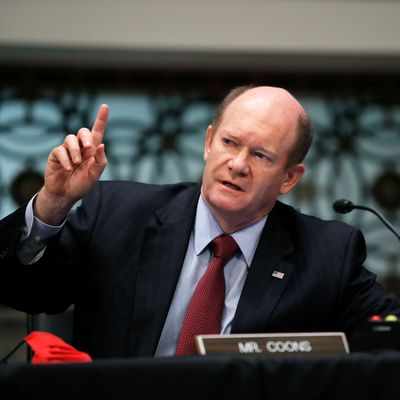
To the subset of left-of-center political writers who are interested in “theories of change” — how, exactly, various politicians intend to enact the policies they espouse — one of the enduring disappointments of the 2020 Democratic presidential nominating process is that the two finalists stubbornly opposed filibuster reform: elimination of the ability of a Senate minority to stop legislation with just 41 votes. Bernie Sanders claimed he would create a “political revolution” that would somehow overwhelm Republican obstruction in the Senate, while Joe Biden professed to believe he could bring back bipartisanship. As Paul Waldman observed last year, these illusions were not minor:
[I]magine it’s 2021, a Democrat has won the presidency, and Democrats have narrowly taken control of the Senate. That president, even if it’s a relative moderate like Biden, will have campaigned on promises of sweeping change: health-care reform that dramatically expands government’s role in providing coverage, strong action on climate change, steps to address the epidemic of gun violence, infrastructure spending, an increase in the minimum wage, increasing taxes on the wealthy, moves to secure voting rights, reform to drug laws, and so much more.
And if the filibuster remains in place, McConnell can say, “Sorry. You get nothing.” The next Democratic presidency will be an abject failure, both substantively and politically.
Unsurprisingly, Senate Democrats have been reluctant to mess with the single most consequential institutional prerogative of the body in which they serve, though the presidential campaign did move some of them; Elizabeth Warren flatly supported filibuster reform, and Kamala Harris, Amy Klobuchar, and Cory Booker became “open” to the idea.
But with Biden, who served for 36 years as a senator and then another eight years as president of the Senate (a big part of the vice-presidential gig), as the putative Democratic nominee, the idea of filibuster reform as an initiative of the Biden administration seemed remote. That’s until now, as Politico’s Marianne Levine reports:
If Joe Biden wins in November, much of his agenda will hinge on a potentially surprising power-player: Chris Coons …
The Delaware Democrat maintains almost familial ties with Biden, while also enjoying close relationships with GOP senators, with whom he’s starting to have conversations about what the Senate could look like if Biden is elected president …
With Democrats’ odds growing to win the White House and potentially the Senate, lawmakers are beginning to envision life under a Biden administration. And Coons would play a critical role in shepherding the former vice president’s legislative priorities.
Coons used to be the staunchest Democratic opponent of filibuster reform. In 2017, he co-wrote a letter with Republican Susan Collins urging their colleagues to keep the great lever for obstruction in operation, pledging to “partner with our colleagues across the aisle to get things done for the American people.” Hah.
Now Coons is hedging his support for the filibuster:
“I will not stand idly by for four years and watch the Biden administration’s initiatives blocked at every turn,” Coons said. “I am gonna try really hard to find a path forward that doesn’t require removing what’s left of the structural guardrails, but if there’s a Biden administration, it will be inheriting a mess, at home and abroad. It requires urgent and effective action.”
So Coons is warning Mitch McConnell (assuming McConnell is reelected in November) that if he resumes the obstructionist stance he had during Barack Obama’s presidency, filibuster reform will no longer be off the table. And in that clear signal, Coons is very likely speaking for Biden, whose old seat he occupies.
It’s no more than a door cracked open for filibuster reform, but it’s a start.






























